Studying Time: 8 minutes
What’s a legacy buyer engagement instrument?
Once you consider legacy buyer engagement instruments, stand-alone CRMs, e-mail advertising software program, advertising automation instruments, and analytics dashboards come to thoughts. These instruments want their database in a schema that’s appropriate with that exact instrument.
Does it work in isolation? Sure.
Nonetheless, the State of Martech 2025 report claims that the typical martech stack owned by enterprises has 90-120 instruments. Additionally, entrepreneurs are analyzing extra information factors and attributes than ever earlier than to offer a personalised buyer expertise.
To sort out the issues that might come up with disjointed instruments and information, entrepreneurs have been in search of built-in martech stacks that scale back the variety of information silos and instruments within the stack.
So, to maintain up with the altering tides, legacy platforms like Salesforce and Adobe went on an acquisition spree to broaden their product portfolios. This included e-mail advertising instruments, cloud infrastructures, information analytics, and enterprise intelligence instruments.
On the finish of the day, these instruments have been nonetheless separate instruments with separate databases and their very own schema, now owned by these legacy manufacturers. 🤦
Shopper manufacturers that bought these legacy stacks have been:
- ⚠️ Nonetheless struggling to optimize buyer experiences
- ⚠️ Nonetheless coping with disparate information that was virtually incoherent
- ⚠️ Nonetheless paying what they have been paying (or much more) for all these instruments individually
Legacy Buyer Engagement Instruments: The Good, The Unhealthy, and The Sus
The Good and the Unhealthy
Whereas the instruments acquired by the legacy platforms have been individually good at their specialised features (eg, e-mail advertising, analytics, and so forth), after they got here collectively, the end result was removed from synergistic.
New issues that got here up included:
- ❌Knowledge silos
- ❌Inconsistent buyer view throughout instruments
- ❌Restricted personalization because of fragmentation in buyer information
- ❌Inefficient workflows leading to handbook information cleansing and transfers
- ❌Issue in real-time analytics
- ❌Incapability to scale as buyer information quantity and complexity continue to grow
- ❌Fragmentation within the buyer journey, leading to disjointed experiences for the client
- ❌Integration challenges whereas making an attempt to mix particular person legacy instruments
- ❌Mediocre outcomes from AI instruments since information is fragmented and silos
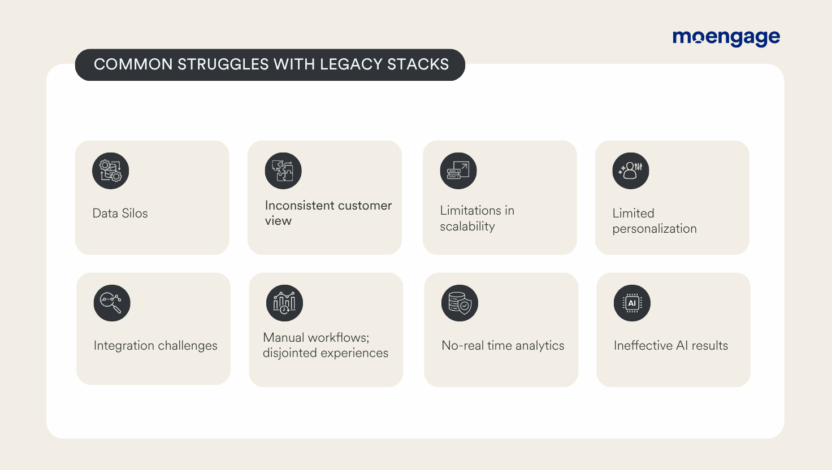
The Sus
With legacy stacks, the preliminary funding is just the start. Some observations we’ve got seen from speaking to 100s of consumers globally who’ve migrated from these legacy stacks embody:
- Implementation and onboarding prices: Can range from a number of thousand to over $100,000 primarily based on complexity, want for customized add-ons, and expert implementation companions.
- Implementation timeline: The common time noticed within the partial implementation of an enterprise buyer engagement stack ranges from 6-12 months. That is the typical length taken for the platforms to simply go reside, and isn’t the whole length.
- Hidden prices: These legacy instruments usually require their prospects to mandatorily improve (paid) to the newest model of various instruments within the martech stack, which basically is a sneaky method for an ecosystem lock-in.
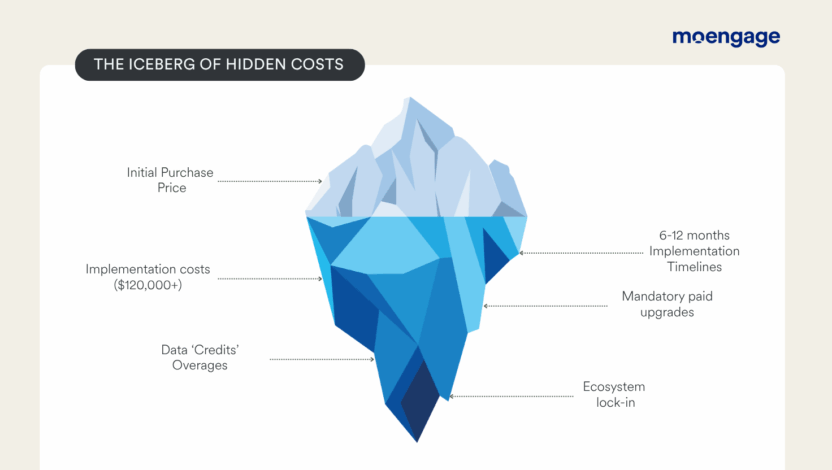
Influence on TCO?Legacy buyer engagement platforms are infamous for giving obscure and overoptimistic timelines for implementation and, future improve charges, and potential value hikes. Furthermore, since their pricing mannequin relies on ‘information credit,’ the probabilities of burning by these credit within the state of affairs of making an attempt real-time engagement are excessive. In essence, client manufacturers that select legacy buyer engagement platforms find yourself paying way more with time, assets, and missed alternatives for real-time engagement. |
Deconstructing the Energy of a Buyer Knowledge and Engagement Platform (CDEP)
As an alternative of getting a number of mutually incompatible instruments forcefully match collectively, what if entrepreneurs and product homeowners had a single streamlined answer?
A single platform the place your buyer information basis and your engagement channels are designed to work collectively from the beginning.
That’s your Buyer Knowledge and Engagement Platform (CDEP).
CDEP vs Legacy Buyer Engagement Stacks: A Comparability
A Buyer Knowledge and Engagement Platform (CDEP) like MoEngage presents a big and intentional evolution from legacy buyer engagement instruments by providing a extra unified, versatile answer that gives client manufacturers greater ROI at a decrease TCO.
Unified Core Knowledge Administration Functionality and Omnichannel Orchestration
Legacy techniques usually require separate, disjointed instruments for various features, resulting in information silos and inconsistent buyer experiences. A CDEP, then again, offers an all-in-one platform.
Inbuilt Capabilities: Not like legacy stacks that necessitate separate purchases for advertising suites, journey optimizers, personalization engines, analytics platforms, and loyalty administration software program, a CDEP has these options inbuilt. This contains omnichannel orchestration throughout e-mail, push notifications, SMS, in-app messaging, and net.
Knowledge Ingestion and Unification: Whereas legacy instruments have restricted information supply help, a CDEP can ingest information from all kinds of sources, together with net/app SDKs, APIs, offline information, and information warehouses. It permits for the creation of customized objects and attributes, enabling extra refined information modeling and segmentation immediately from an information warehouse.
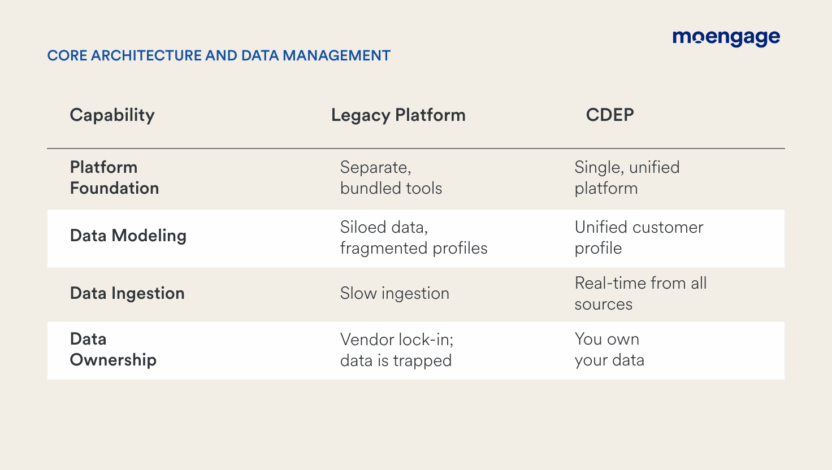
Knowledge Democratization and a Vendor-Impartial Ecosystem
A major downside of legacy instruments is their ‘locked-in’ ecosystem, which restricts integration with outdoors platforms. CDEPs are designed for flexibility and interoperability.
Open Integration: CDEPs provide sturdy pre-built connectors and in depth API flexibility for customized integrations with main martech platforms. This contains over 250+ integrations throughout promoting, enterprise analytics, cloud storage, and information warehouses, fostering a vendor-neutral setting.
Knowledge Democratization: CDEPs allow information democratization by permitting companies to retailer their information in their very own warehouses (like Snowflake, Redshift, or Google Cloud Platform), thereby breaking down the information silos which are attribute of legacy techniques.
Superior AI and Machine Studying Capabilities
Synthetic intelligence is on the core of a CDEP, providing refined instruments for hyper-personalization and optimization that usually require separate and dear purchases with legacy techniques.
Inbuilt AI Suite: CDEPs include an built-in AI suite that gives options like content material and picture technology, 1:1 personalization at scale, AI-assisted section creation, and journey optimization. This contrasts sharply with legacy instruments, the place every of those functionalities can be a separate, add-on buy.
Predictive Analytics: Predictive fashions for buyer affinity and conduct, in addition to send-time and channel optimization, are constructed into the CDEP.
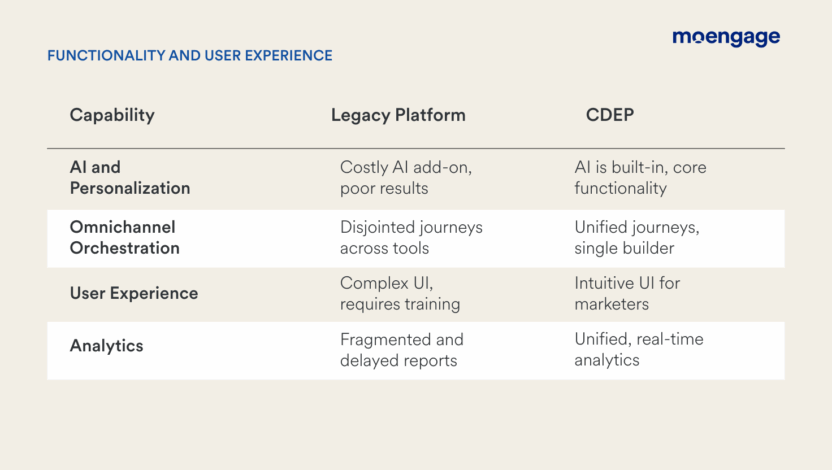
Improved Scalability, Safety, and Efficiency
CDEPs are constructed on trendy, extremely scalable, and elastic structure to deal with real-time information ingestion and processing. In addition they adhere to the newest safety and compliance requirements, providing options like information encryption, PII masking, and tokenization, and compliance with rules comparable to GDPR and CCPA.
Enhanced Transactional Messaging Capabilities and Consumer Expertise
Within the realm of transactional messaging, CDEPs provide vital efficiency benefits.
Pace and Reliability: They supply real-time supply with lower than 2-second latency and a excessive diploma of reliability (99.99% uptime and 100% SLA).
Unified and Good Orchestration: A single API can be utilized for unified messaging throughout all channels, with the flexibility to set channel precedence and vendor fallbacks prematurely—a function absent in legacy instruments.
Intuitive UI and Superior Assist: CDEPs are designed with an easy-to-use, intuitive consumer interface. That is supported by highly-rated customer support, complete migration help, and optimistic neighborhood opinions, addressing widespread ache factors of the steep studying curves and unhelpful help related to legacy platforms.
Clear Pricing and Decrease Complete Value of Possession (TCO)
The financial benefits of adopting a CDEP are substantial, significantly when contemplating the whole value of possession.
Simple Pricing: CDEPs usually provide usage-based pricing with no hidden prices or add-ons.
Decreased Implementation Prices and Time: The implementation timeline is considerably shorter (e.g., lower than 3 months for a CDEP vs. 6-12 months for a legacy stack), and there are sometimes no additional implementation prices. In distinction, legacy techniques steadily contain implementation advisor prices, excessive implementation timelines, and costly add-ons and upgrades. This proactive method helps enterprises decrease their TCO.
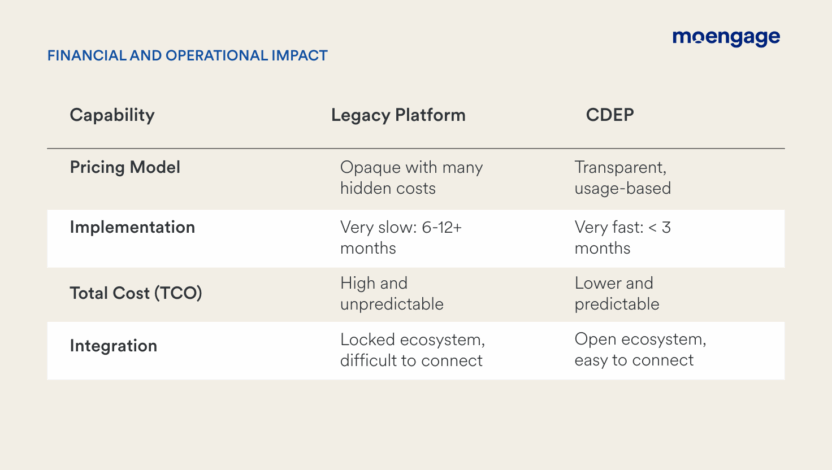
Seeking to migrate from a legacy buyer engagement stack to a CDEP?
Right here is how MoUpgrade might help your model:
- Speed up Time-to-Worth with a swift migration course of.
- Minimizes disruptions with a structured, seamless transition course of in order that your reside campaigns and information flows aren’t impacted negatively.
- Full and protected switch of all of your buyer information.
- Devoted migration managers and managed providers for a seamless transition to CDEP.
- Migration credit to assist offset bills incurred in platform migration.
CDEP vs Legacy Buyer Engagement Stacks: Which is Higher For Your Model? (A Decisioning Framework)
In case you’re prepared to chop your losses incurred with a legacy buyer engagement stack however want to achieve this in a structured vogue, we’ve obtained you coated.
Beneath is a framework you may undertake to make the precise choice in the very best pursuits of your online business.
Step 1: Discover the Hole(s)
Audit Your Tech Stack
Now just isn’t the time to be sentimental along with your tech purchases or be swayed by shiny guarantees. Check out your tech stack and map how buyer information is flowing between the instruments.
- 🔍Establish what your stack does (not what was claimed) and what it doesn’t do (regardless of what was claimed).
- 🔍Establish frictions and bottlenecks within the circulate of information throughout your buyer engagement stack
Map The Buyer Journey
What can be the best journey you’d need on your prospects? Distinction that with the present flows arrange within the legacy buyer engagement stack.
- 🔍The place does the client expertise really feel disconnected?
- 🔍The place does the client expertise fall in need of your model’s requirements for buyer satisfaction?
Quantify the Loss
Now that you just’ve recognized functionality gaps and the corresponding gaps in your superb buyer journey, put a quantity on it.
Analyze and estimate income losses from cart abandonment, excessive churn charges, the operational prices of operating a bloated stack, and the chance value of being gradual to market.
Step 2: Outline the ‘North Star’- Envision the Splendid Buyer Expertise
Step 1 helped you determine the gaps. Step 2 will enable you construct the best hyper-personalized buyer journey.
Envision the 1:1 Journey:
What would you do in case you had excellent, real-time information about each single buyer? How will the client journey look in such a state of affairs?
Establish Excessive-Influence Use Instances:
You’ll be able to’t do the whole lot without delay. Prioritize the highest 3-5 use instances that can drive essentially the most fast and vital impression on your online business.
Set up Enterprise-Vital KPIs:
Transfer past self-importance metrics like open charges. Your success metrics should be tied to core enterprise outcomes like buyer lifetime worth (CLV), retention charges, and so forth.
Step 3: Select a True Development Companion, Not Only a Platform
You aren’t simply shopping for or subscribing to a tech stack. You might be investing in a progress companion who might help you scale your online business. Select a real progress companion with a confirmed observe report of scaling progress in your trade.
By following this 3-step decision-making framework, you may choose a companion that can enable you flip each buyer interplay right into a stepping stone for sustainable, long-term progress.
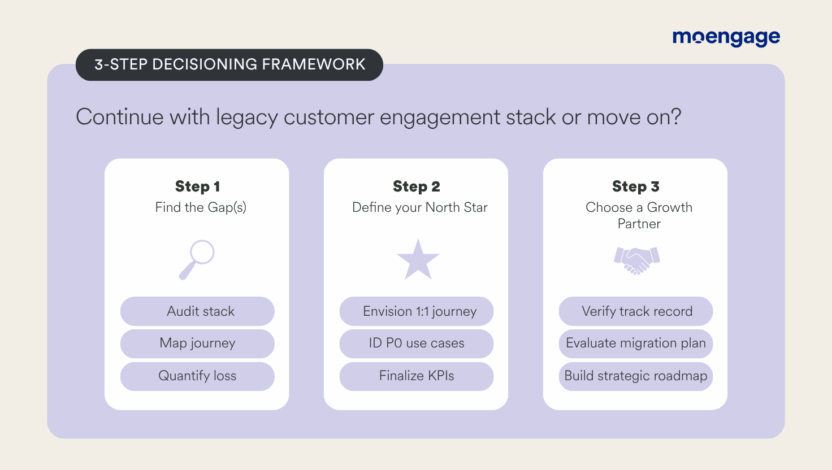
Conclusion: Concentrate on the Future Development, Not on the Sunken Prices
The choice between a CDEP and a legacy stack boils right down to a easy strategic query: Are you investing in future progress or paying to take care of previous complexity?
Legacy platforms are infamous for inflicting operational delays because of in depth information silos and hidden prices, which drives up the Complete Value of Possession (TCO).
In distinction, a contemporary CDEP is architected for agility, effectivity, and decreasing the TCO. By unifying information and engagement, it eliminates the necessity for a disjointed, costly stack and empowers your groups with the AI-driven insights wanted for true 1:1 personalization.
For manufacturers centered on long-term profitability and market management, a CDEP isn’t only a higher instrument—it’s the smarter enterprise choice.
Keen to interrupt free from the ecosystem lock-in and information silos posed by legacy stacks? Ebook a demo to speak with our group in the present day.

